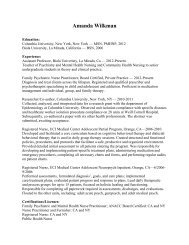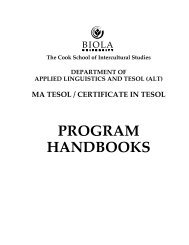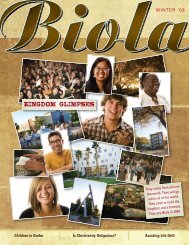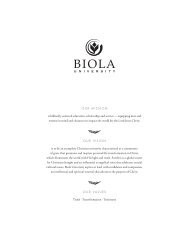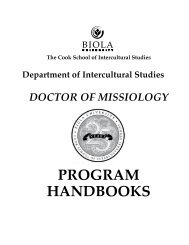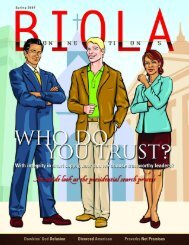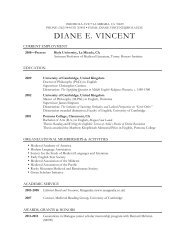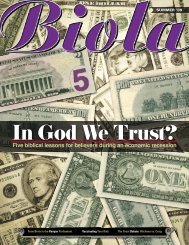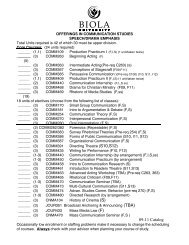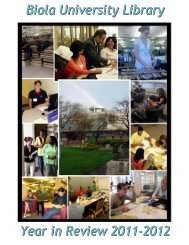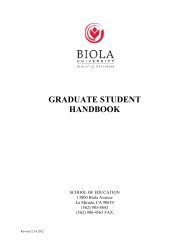A growing number of Christians are embracing the ... - Biola University
A growing number of Christians are embracing the ... - Biola University
A growing number of Christians are embracing the ... - Biola University
You also want an ePaper? Increase the reach of your titles
YUMPU automatically turns print PDFs into web optimized ePapers that Google loves.
2 6<br />
A S K A N E X P E R T<br />
What is an Evangelical in 2008?<br />
The word “evangelical” is a loaded one<br />
<strong>the</strong>se days — with political, cultural and<br />
religious connotations that frequently<br />
differ depending on who you ask. It’s a word<br />
some <strong>Christians</strong> have suggested we phase out,<br />
while o<strong>the</strong>rs hold that we should reclaim. At <strong>the</strong><br />
end <strong>of</strong> a two-term presidency very publicly<br />
labeled “evangelical,” in which evangelicals rose<br />
to an unparalleled level <strong>of</strong> political power, many<br />
<strong>are</strong> wondering: Should we reevaluate <strong>the</strong> evangelical’s<br />
role in public life? Do evangelicals need<br />
something <strong>of</strong> a PR makeover? How should a historically<br />
evangelical institution like <strong>Biola</strong><br />
respond to <strong>the</strong> changes and challenges <strong>of</strong> being<br />
an “evangelical” in 2008?<br />
<strong>Biola</strong> Magazine sat down with Robert Saucy,<br />
distinguished pr<strong>of</strong>essor <strong>of</strong> systematic <strong>the</strong>ology at<br />
Talbot, to discuss <strong>the</strong>se and o<strong>the</strong>r questions<br />
related to evangelical identity in 2008.<br />
Bob, how do you think <strong>the</strong><br />
word “evangelical” is changing?<br />
In <strong>the</strong> latter half <strong>of</strong> <strong>the</strong> 20th century, <strong>the</strong> term<br />
“evangelical” began to become more elastic as<br />
some within evangelicalism began to assert views<br />
contrary to traditional evangelicalism. Histor i -<br />
cally, <strong>the</strong> term applied to <strong>the</strong> movements <strong>of</strong> <strong>the</strong><br />
Reformation that focused on <strong>the</strong> gospel and God’s<br />
authoritative word but whose evangelical spirit<br />
was manifest in many ways from <strong>the</strong> apostolic age<br />
throughout church history. Traditionally, “evangelicalism”<br />
was marked by such doctrines as a<br />
strong authority <strong>of</strong> an inerrant Scripture, <strong>the</strong> sinfulness<br />
<strong>of</strong> man, salvation by grace through faith<br />
based upon <strong>the</strong> substitutionary atoning death <strong>of</strong><br />
Christ, heaven and hell, and holiness <strong>of</strong> life<br />
including a separation from <strong>the</strong> “worldliness” <strong>of</strong><br />
<strong>the</strong> world.<br />
Today we find some within evangelicalism<br />
rejecting or minimizing some <strong>of</strong> <strong>the</strong>se traditional<br />
evangelical doctrines such as <strong>the</strong> inerrancy and<br />
full authority <strong>of</strong> Scripture, <strong>the</strong> substitutionary<br />
atonement <strong>of</strong> Christ and eternal punishment for<br />
those who reject Christ. Some <strong>are</strong> moving away<br />
from an understanding <strong>of</strong> <strong>the</strong> gospel as personal<br />
salvation through repentance and faith in Christ’s<br />
substitutionary work on <strong>the</strong> cross in favor <strong>of</strong> what<br />
might be termed a kingdom gospel meaning that<br />
believing <strong>the</strong> gospel means becoming involved in<br />
<strong>the</strong> mission <strong>of</strong> Christ’s kingdom, i.e. social and<br />
economic justice, peace and ecological concerns.<br />
I would also point to a change, at least within<br />
American evangelicalism, in relation to <strong>the</strong> separation<br />
from <strong>the</strong> world, becoming more like <strong>the</strong><br />
world in lifestyle, as George Barna’s surveys seem<br />
to indicate.<br />
When non-<strong>Christians</strong> hear <strong>the</strong><br />
word “evangelical,” what do <strong>the</strong>y<br />
think? What should <strong>the</strong>y think?<br />
I believe that most non-<strong>Christians</strong> think <strong>of</strong><br />
“evangelical” as referring to a group <strong>of</strong> poorly<br />
educated, unscientific obscurants whose attitude<br />
is basically negative. They probably also conceive<br />
<strong>of</strong> evangelicals as hypocritical — pr<strong>of</strong>essing a<br />
holiness, but not living it. While evangelicals <strong>are</strong><br />
surely a mixed bag, non-<strong>Christians</strong> should see<br />
evangelicals as people who, like <strong>the</strong> vast majority<br />
<strong>of</strong> people who have ever lived, believe in a God<br />
and that this matters in life and death.<br />
What <strong>are</strong> <strong>the</strong> top misconceptions<br />
<strong>of</strong> evangelicals that <strong>are</strong> propagated<br />
in <strong>the</strong> press?<br />
The impression that one would get from <strong>the</strong> press<br />
is that evangelicals <strong>are</strong> primarily a right-wing<br />
political movement that seeks to control <strong>the</strong> lives<br />
<strong>of</strong> o<strong>the</strong>rs. The press pays little attention to what is<br />
B I O L A



